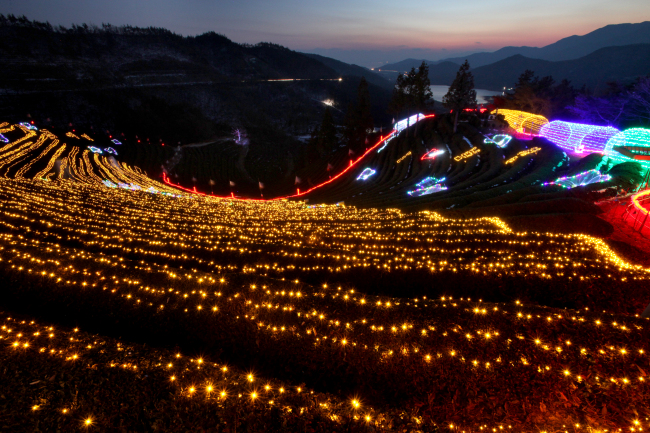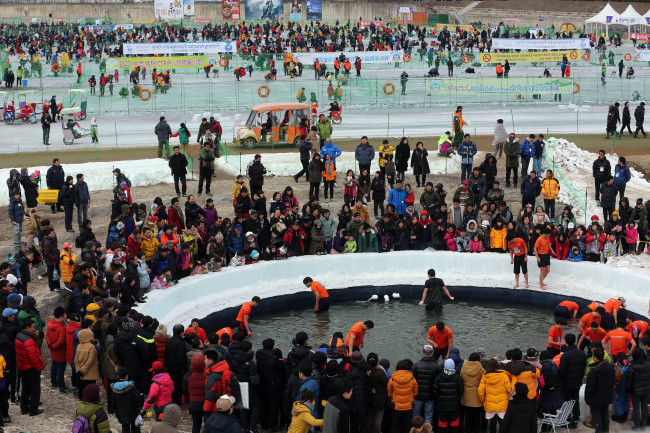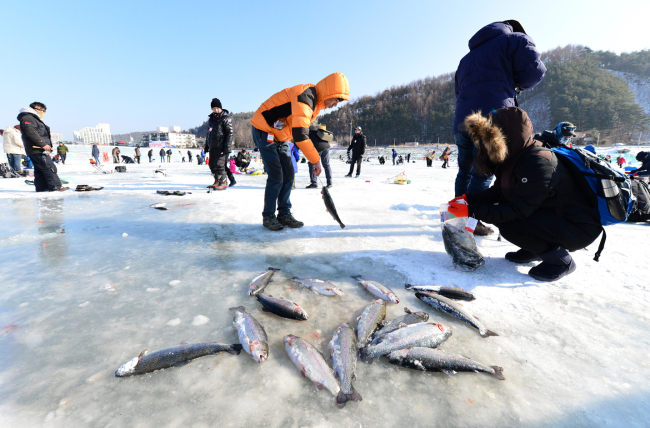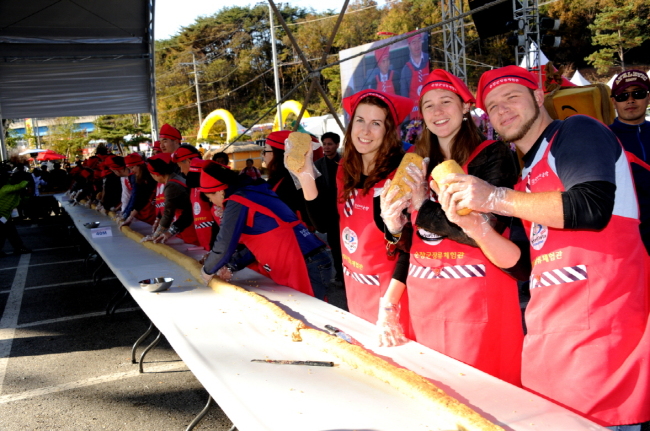Local festivals offer unique adventures in Korea
From trout fishing in cold provinces to authentic bibimbap, Korea offers a lineup of top festivals for 2014
By Lee Woo-youngPublished : Jan. 7, 2014 - 19:34

Korea has seen the number of local festivals increase for the past couple of years, led by provincial governments’ push for tourism revenue.
Some attracted thousands of visitors including foreign tourists and expat residents, establishing themselves as the most popular events in Korea. However, others still flounder with disappointing programs which make visitors feel deceived by flash promotions.
For those looking for credible festival information, the Culture Ministry and the Korea Tourism Organization updates the list of recommended festivals every year. Some festivals on this year’s list are worth being marked on the calendar for travel plans.

Hwacheon Sancheoneo Ice Festival has become one of the best winter festivals in Korea attracting more than 1 million visitors each year for the past seven years. The festival, taking place in the scenic mountain town of Hwacheon, Gangwon Province, until Jan. 26, invites visitors to catch trout under the 30-centimeter-thick ice. They can also have fun joining a variety of outdoor winter activities such as sledding, ice sculpting and ice soccer. Visitors can angle either with their own or rented fishing rods and cook their own catch at cooking stands at the venue. Admission is 12,000 won for teenagers and adults and 8,000 won for foreigners, children and those over 65. For more information, visit www.narafestival.com.

Another trout-fishing festival is held in Pyeongchang, which is the venue for the 2018 Winter Olympic Games and one of the coldest regions in Korea with record snowfalls. The festival, which lasts until Feb. 2, offers dynamic activities such as riding four-wheel ATVs on the ice, snow rafting and sleigh trains. For more information, visit www.festival700.or.kr.
The popular resort island of Jeju attracts an increasing number of visitors each year with the Jeju Olle Walking Festival held on the high-profile walking trail Olle. Its programs are designed to help visitors enjoy the natural beauty of the island. The event held each fall consists of a walk along select Olle trails during the festival period and many cultural events. In 2013, participants walked on courses No. 14-16 which are set along the west coast of the island and meander through local villages. Cultural performances, concerts and food reanimate the vibrant indigenous Jeju culture. For more information, visit www.jejuolle.org.
The Boseong green tea plantation transforms into a dazzling light show in winter during the Boseong Green Tea Plantation Light Festival. During the festivities, the terraced tea field in Boseong, South Jeolla Province, is decorated with thousands of colorful light bulbs. The 120-meter-tall “Millennium Tree” decked with more than 100,000 lights has won a Guinness world record.
The southeastern Jeolla provinces, reputed for a variety of cuisine in Korea, hold diverse food festivals throughout the year. Of them, Jeonju Bibimbap Festival and Sunchang Fermented Soybean Festival, both held in October, appeal to both Koreans and foreigners with unique hands-on programs.

Festivals in the provinces offer many opportunities to taste the “original” version of bibimbap, a popular Korean dish (rice mixed with meat and vegetables), and cooking contests to select the best chefs of Korean foods. Many travel programs go around the Jeonju Hanok Village, where tourists may try some of the best local foods. For more information, see www.bibimbapfest.com.
Sunchang, known for fermented soybean paste, draws lovers of Korean fermented soybean and red pepper paste to the annual fermented soybean festival. The festival features a multitude of hands-on programs that include making soybean paste and red pepper paste, along with cooking contests using fermented soybean paste. In one event, participants make bibimbap in a large bowl each year to serve many people, using the freshly made Sunchang red pepper paste. Last year in the event, the bibimbap was made large enough for 2,013 servings. For more information, visit www.jangfestival.co.kr.
By Lee Woo-young
(wylee@heraldcorp.com)


![[Exclusive] Korean military set to ban iPhones over 'security' concerns](http://res.heraldm.com/phpwas/restmb_idxmake.php?idx=644&simg=/content/image/2024/04/23/20240423050599_0.jpg&u=20240423183955)




![[Pressure points] Leggings in public: Fashion statement or social faux pas?](http://res.heraldm.com/phpwas/restmb_idxmake.php?idx=644&simg=/content/image/2024/04/23/20240423050669_0.jpg&u=)










